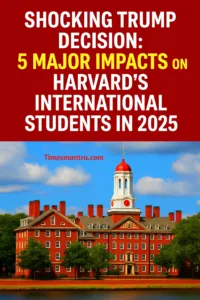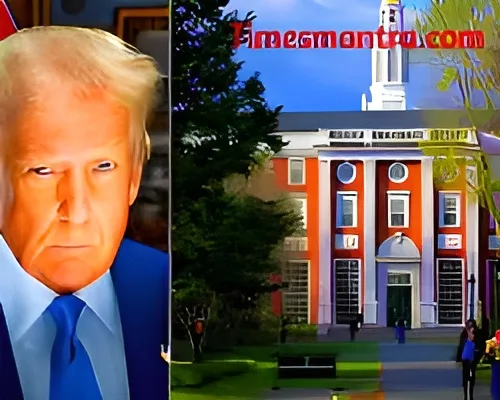Trump Decision Impact Harvard International Students in 2025: What You Need to Know
In 2025, a new wave of immigration reforms spearheaded by former President Donald Trump has reignited global debates on education, mobility, and border control. Among the most affected are international students at elite institutions such as Harvard University. This article explores the impact of Trump’s decision on Harvard’s international student community—covering policy changes, visa restrictions, academic disruption, and global perception of U.S. education.
📌 Understanding Trump’s 2025 Immigration Decision
In early 2025, Donald Trump publicly backed a policy proposal aimed at tightening visa regulations for non-U.S. citizens pursuing higher education. The decision, framed as a national security and economic preservation measure, includes:
-
Shortening the duration of F-1 student visas
-
Limiting work opportunities post-graduation (OPT/CPT programs)
-
Introducing a re-evaluation clause every academic term
-
Increased scrutiny on students from specific countries (notably China, India, Iran)
These proposed changes have sparked anxiety across the U.S. higher education landscape. Harvard University, home to over 6,000 international students annually, stands at the epicenter of this unfolding crisis.
🎓 Harvard’s Global Identity at Risk
Harvard is more than just an American institution—it’s a global academic powerhouse. International students contribute not only to the university’s intellectual ecosystem but also to its multicultural fabric.
Impact on Diversity and Inclusion
If enacted, Trump’s policies could reduce the number of applicants from abroad, particularly from developing nations. The impact here isn’t just numerical—it strikes at the core of Harvard’s identity. A drop in international admissions could:
-
Reduce classroom diversity
-
Lower cross-cultural academic collaboration
-
Hinder Harvard’s global research outreach
This would be a long-term blow to Harvard’s reputation as a leader in inclusive education.

🛂 F-1 Visa Uncertainty: A Growing Concern
One of the most immediate and tangible impacts of Trump’s decision is the potential overhaul of the F-1 visa system. Many students choose the U.S.—and Harvard specifically—because of the educational opportunities and career prospects post-graduation.
Key Areas of Concern:
-
Shorter visa durations mean international students may face constant re-application, causing mental stress and financial strain.
-
Reduced OPT timelines make it harder to gain U.S. work experience, lowering the value proposition of a Harvard degree.
-
Country-specific limitations send a message that education is conditional on politics—not merit.
🧠 Mental Health & Academic Performance
The impact of immigration stress cannot be overstated. Harvard students already face intense academic pressure. Add to that the fear of deportation or visa rejection mid-semester, and you have a mental health crisis in the making.
International students report:
-
Sleep disorders due to immigration uncertainty
-
Difficulty focusing in class
-
Isolation from peers who don’t share these anxieties
The human impact here is real, personal, and tragic.
🌍 Global Perception of U.S. Education
Harvard’s prestige attracts global talent. But that prestige hinges on the assumption that the U.S. is a welcoming and stable environment for academic growth. Trump’s policy decisions send a contradictory message.
Impact on Global Rankings & Enrollment
-
Reduced international enrollment could cause Harvard’s global rankings to slip due to less geographic diversity.
-
Competitor nations like Canada, Australia, and Germany may benefit as they offer more welcoming immigration policies.
The global impact isn’t limited to Harvard—it could redefine the U.S.’s role as the world’s academic hub.
💼 Career Prospects & Brain Drain
Post-study work rights are a critical deciding factor for international students. Harvard graduates often seek employment in top U.S. firms or launch startups. But without reliable visa support, they may be forced to leave the U.S.
Impact on U.S. Innovation
-
Harvard’s international alumni include Nobel laureates, tech founders, and global leaders.
-
If the U.S. pushes talent away, that impact extends to innovation, entrepreneurship, and the economy.
-
Other nations will benefit from this “brain drain,” attracting talent that once defaulted to the U.S.
🧾 Harvard’s Response to the Trump Policy
Harvard administrators and student organizations have been vocal in their opposition to restrictive immigration policies.
Actions taken include:
-
Legal challenges filed in federal court
-
Expanded legal aid and visa counseling for students
-
Collaboration with peer institutions to lobby Congress
Harvard knows that the impact of losing international students is irreversible and damaging.
🗣️ Voices from the Community
Harvard students have taken to social media and campus rallies to protest Trump’s immigration stance. Their message is clear: “We belong here.”
A student from India shared:
“I came here with dreams. Now, I wake up every day wondering if I’ll be forced to leave. The emotional impact is worse than I imagined.”
Such testimonies highlight the emotional and psychological toll of policy-driven fear.
Cambridge, MA – In a development that has sent shockwaves through the academic world, former President Donald Trump unveiled a new federal policy today that could have a profound impact on international students attending elite U.S. universities such as Harvard. This policy threatens to reshape the landscape of higher education and has raised urgent concerns about the future of global academic exchange.
📜 Details of the Policy and Its Potential Impact
The newly proposed “America First Academic Reform Act” (AFARA) introduces significant restrictions on international student enrollment, with a potential impact that could alter university demographics and the diversity of academic communities nationwide.
Key provisions include:
-
Capping international student enrollment at 15% per incoming undergraduate class, drastically reducing opportunities for foreign students.
-
Imposing tougher visa requirements with enhanced background checks and financial scrutiny.
-
Introducing annual national security screenings for students from designated countries, which could delay or deny visa approvals.
-
Cutting the Optional Practical Training (OPT) period for STEM graduates from 3 years to just 1 year, significantly affecting post-graduate employment prospects.
Experts warn the impact of these changes could be far-reaching, limiting the ability of American universities to attract top global talent and hindering research collaboration.
🎓 Harvard and Other Universities Voice Concerns
Harvard University President Claudine Gay responded swiftly, emphasizing the potentially damaging impact on the university community:
“The proposed policy will have a chilling impact on the diversity and inclusivity that define Harvard’s mission. International students are critical to our academic excellence and innovation, and we stand firm in defending their place here.”
Other leading institutions, including Yale, MIT, and Stanford, have voiced similar apprehensions and are exploring legal avenues to challenge the policy’s impact on academic freedom and global exchange.
🌍 Broader Impact on International Students
For international students, this breaking news has caused a wave of increased uncertainty and anxiety about their academic futures in the U.S. According to live news reports, the policy’s restrictive measures are expected to significantly impact visa approvals, limit career opportunities after graduation, and discourage many prospective students worldwide from applying.
Education experts and student organizations have voiced concerns in recent news updates, warning that the long-term impact of these restrictions could lead to a sharp decline in the U.S.’s ability to attract top global talent. Such a shift would seriously undermine America’s standing as a global leader in higher education and innovation.
✅ Conclusion: A Defining Moment for U.S. Education
The Trump decision’s impact on Harvard’s international students is not a single event—it’s a ripple effect that could reshape higher education in America for years to come.
From visa uncertainty to career instability and mental health struggles, the stakes are high. Harvard, and by extension the United States, must decide: does it want to remain a beacon of global education, or will policy drive talent away?
One thing is certain—the world is watching, and the impact will be felt far beyond Harvard Yard.
- COVID-19 Returns in India: New Wave, New Variant, Fresh Warnings
- US House Republicans Set Pre-Dawn Votes to Pass Trump Tax Bill
- Tomorrow’s Clash Could Reshape the Points Table — Are You Ready?
COVID-19 Returns in India: New Wave, New Variant, Fresh Warnings
Tomorrow’s Clash Could Reshape the Points Table — Are You Ready?
